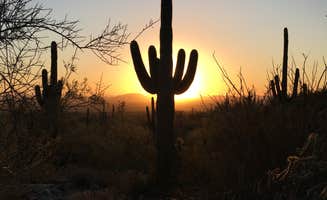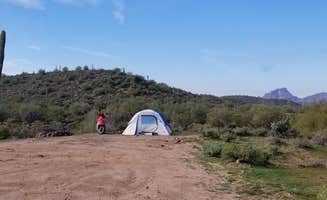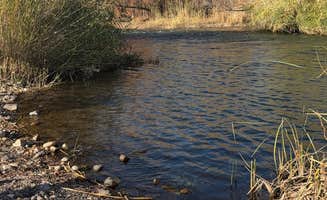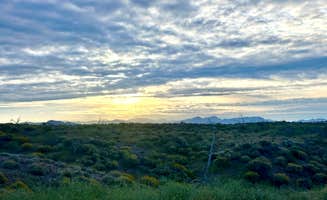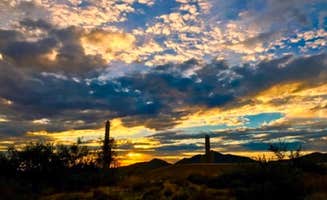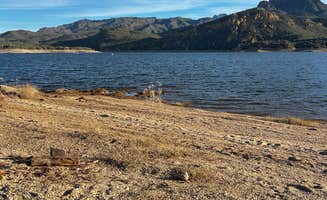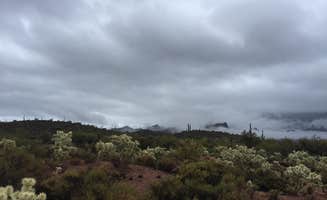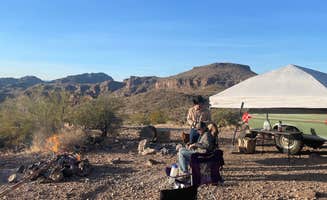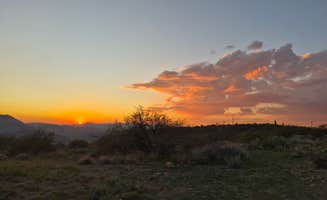Dispersed camping sites surrounding Fountain Hills, Arizona offer primitive camping on public lands within 30-45 minutes of town. The Sonoran Desert terrain ranges from 1,500-2,500 feet elevation, creating varied microclimates between different camping areas. Seasonal temperature swings can exceed 30 degrees between day and night, especially during winter months when dispersed camping is most comfortable.
What to do
**Wildlife viewing: Diverse desert species inhabit these areas. A visitor at Bulldog Canyon Dispersed Camping - North Entrance noted, "Easy to get a permit from the ranger station... I love that it's not far out of town but an easy place to forget you live in town."
**River access: Several sites offer water recreation opportunities. At Box Bar Road Dispersed, campers appreciate the water proximity: "It's gorgeous. Not very many spots but love being right by the river... my dog loves the water."
**Off-road trails: Many sites connect to OHV trail networks. One camper at Bulldog Canyon shared, "Better to have a 4 wheel drive with decent clearance for some of the trails. Most camp spots aren't too deep in so it's easiest to access."
What campers like
**Desert isolation: Despite proximity to urban areas, sites offer solitude. A camper at Hackamore Road Dispersed mentioned, "It's got great views of the mountains, TONS of awesome trails to walk/ride love the access to the little ghost town nearby."
**Reservoir access: Water-based recreation at nearby lakes. At Bartlett Reservoir, a visitor noted, "Best thing about this lake is back up to water & pitch ur tent.. no set camp area, just make yourselves comfy where u choose."
**Minimal regulations: Free camping near Fountain Hills offers flexibility. A camper at Hackamore Road shared, "This is a nice quiet spot with excellent cell service. It's on BLM land, so you are out of the reach of the Arizona Land Permits."
What you should know
**Road conditions: Access to most sites requires consideration. At Mesquite Wash Dispersed, a camper warned, "The sites itself are right off the highway. Plenty of spots and flat ground to camp on. However, the road to get down to the sites is pretty rough. Would recommend 4x4 capabilities."
**Permits: Some areas require permits while others don't. For Bulldog Canyon, a visitor explained, "Easy to get a permit from the ranger station. Just email your name, address, phone number and driver's license number to sm.fs.mesa_ohs@usda.gov and you'll get your permit within 2 days for free."
**Noise concerns: Activity levels vary by location and day. At Hackamore Road, one camper noted, "We were here for a week last year, came back as our first spot on the trip this year and it was awesome again."
Tips for camping with families
**Water accessibility: Choose sites with safe water features. A camper at Box Bar Road shared, "Outhouses are well maintained. Bring your own water though and you do need to pay ahead of time, there are no pay boxes on site."
**Avoid difficult terrain: Some areas have hazards for children. At Sycamore Creek Recreation Area, a visitor noted, "The road was easily navigated by our sprinter van, but there are parts of the road that are a bit washed out. The road looks like it may flood in certain months of the year."
**Privacy options: Sites vary in isolation levels. One camper at Box Bar Road mentioned, "I was pleasently surprised at the many little nooks of privacy that you could set up camp."
Tips from RVers
**Clearance requirements: Many dispersed camping sites near Fountain Hills require high-clearance vehicles. A visitor at Hackamore Road warned, "So unless you have high clearance. Stay away. We have a 40ft school bus and we'll if not for the potholes Everywhere it's the horrid uneven land."
**Proximity to services: Consider distance to necessities. At Stewart's Camp, a camper noted, "There's no cell service which makes this place a perfect place to just get away without having to go forever away from the valley."
**Site selection: RVers should scout first. At Sycamore Creek, a visitor advised, "I would hesitate bringing an RV past the first few sites, but could be attempted."


